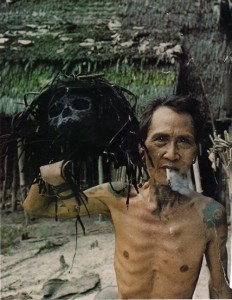target=”_blank”>Hidup Biasa, translation from Serum #3
The Iban Dayaks from Semunying had always lived simply alongside their natural environment. Then in 2005 an oil palm plantation company appeared, wanting to take over the ancestral forest that had been the backbone of people’s livelihoods for generations.
One year previously the company had obtained permission from the regency government for a 20,000 hectare plantation in Jagoi Babang district. Included in the permit area were 1,420 hectares of land for which the Iban Dayaks were the customary landowners. At first, PT Ledo Lestari, a subsidiary company of Duta Palma Nusantara Group, only built a road which passed close to the ancestral forest. But as time passed, they continued to take more of the land, taking space from the people without permission and eventually clearing their ancestral forest.
While this was going on, the people were fighting for their rights to the forest by conveying their grievances to the local, provincial and national governments. Through their testimony and complaints they even tried to raise the issue at an international level.
On the 15th December 2009 the Bengkayang regency leader designated the 1420 hectares as the ancestral land of Semunying Jaya village, later reinforcing this designation with an official decision (SK 30A/2010). However, it is in the nature of all governments to support the rich and business interests, and so the people’s cries were not listened to and Ledo Lestari was free to fell the forest and replace it with oil palm.
Now aware that the corrupt government, side-by-side with the greedy company, was not going to release their land, on the 7th April 2012 the people of Semunying commenced a week-long occupation where they sealed off the company’s office, seized various items of heavy machinery and operational vehicles, closed the nursery for young trees, and put a stop to the ongoing logging work. “On Monday morning we stopped their ongoing attempts to fell our ancestral forest. Since that Monday, we have continued step-by-step, eventually taking over three excavators, three trucks, three motorbikes, two chainsaws, one bulldozer, as well as closing down PT Ledo Lestari’s offices and tree nurseries. We are demanding our rights back!”, said Abupilah, the Semunying Jaya village secretary.
The people explained that the reason for their resistance was that they knew that as new oil palm plantations were created, they would lose their forests, their land, their forest gardens, their hunting grounds,space to clear for fields and building materials for their houses. Local customs and culture would also be extinguished. Aside from this, the company had closed off the stream which was the source of clean water for the village, making it difficult to obtain clean water.
The company was still determined to keep operating, giving the reason that it had obtained permission from the government. The company also argued that since the forest had only been declared as protected ancestral land five years after they started production, they could not just stop work on the plantation. In the end PT Ledo Lestari kept working because the office and vehicles which the people had seized were only a small part of the company’s equipment and supporting facilities.
